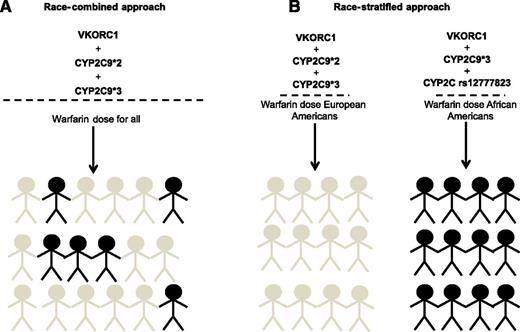In this issue of Blood, Limdi and coauthors demonstrate that racially informed warfarin pharmacogenetic algorithms perform better than traditional algorithms, which previously excluded genetic variants that are unique to patients with African ancestry.1
The concept of race-combined approaches to warfarin pharmacogenetics compared with a race-stratified approach. (A) The race-combined approach assumes that the genetic variants included in the model will demonstrate equal effects on dosing requirements regardless of genetic ancestry. (B) The race-stratified approach illustrates the concept that genetic ancestry could influence the genetic predictors that are useful for warfarin pharmacogenetics in patient subpopulations.
The concept of race-combined approaches to warfarin pharmacogenetics compared with a race-stratified approach. (A) The race-combined approach assumes that the genetic variants included in the model will demonstrate equal effects on dosing requirements regardless of genetic ancestry. (B) The race-stratified approach illustrates the concept that genetic ancestry could influence the genetic predictors that are useful for warfarin pharmacogenetics in patient subpopulations.
Approximately 34 million warfarin prescriptions are filled annually in the United States to reduce the morbidity and mortality associated with various hypercoagulable states.2 Warfarin, a vitamin K antagonist, is a potent anticoagulant with proven efficacy when patients reach therapeutic anticoagulation goals. However, warfarin demonstrates significant interpatient variability in dose requirements, and it has a narrow therapeutic index. This makes warfarin difficult to manage despite the use of widespread multidisciplinary anticoagulation clinics dedicated to its management and monitoring. Warfarin’s variability in dosing requirements and narrow therapeutic index contribute to this drug being a leading cause of the adverse drug events requiring hospitalizations in the United States.3 Therefore, clinicians and researchers have been working for years to optimize the efficacy and limit the adverse events associated with warfarin.
Genetic variants that influence the target of warfarin’s pharmacodynamic effects (vitamin K epoxide reductase complex 1 [VKORC1]) and its primary metabolism pathway (cytochrome P450 2C9 [CYP2C9]) have been suggested among the predictors of warfarin efficacy and adverse events. However, 2 recent large genotype-guided trials designed to evaluate their prospective usefulness generated incongruent results.4,5 The Clarification of Oral Anticoagulation through Genetics (COAG) trial suggested that genotype-guided dosing was not more beneficial than clinical-based dosing.4 However, the European Pharmacogenetics of Anticoagulant Therapy (EU-PACT) trial demonstrated that genotype-guided therapy was superior to clinical based dosing.5 The inconsistent reports were puzzling, and the scientific community generated several hypotheses on factors that may explain the observed results. A leading hypothesis was generated from the observation that COAG contained substantially more racial heterogeneity when compared with EU-PACT (∼27% black vs ∼1% black). This hypothesis is feasible if we consider the fact that the genotype-based dosing algorithm was based upon data largely generated in cohorts of individuals of European ancestry. Furthermore, individuals of African ancestry have differing inheritance patterns of genetic variation when compared with Europeans.6 This observation has been associated with heterogeneity of genetic predisposition for disease risks and pharmacogenetic responses on many occasions in the literature. Therefore, it was logical to investigate the effects of African ancestry on the effectiveness of the largely European-ancestry–based genotype-based algorithms from COAG and EU-PACT.
Limdi et al investigated the effectiveness of ancestry-informed (“race-stratified”) genotype-guided dosing compared with the COAG algorithm that was based primarily on data generated in cohorts of European ancestry (“race-combined” approach) (see figure). The race-stratified genotype-guided dosing algorithm included recently discovered genetic variants that have been associated with warfarin response in African Americans.7,8 Limdi et al’s cohort was composed of 1357 participants, 44% of whom were African American. In this diverse cohort, the COAG algorithm (race-combined approach) demonstrated variability in usefulness based upon race. Only 1 of the 3 included genetic markers was equally predictive of dose requirements for African Americans and European Americans (CYP2C9*3), whereas the other 2 genetic markers demonstrated a significantly larger effect on dosing requirements in European Americans when compared with African Americans (CYP2C9*2 and VKORC1). This could have resulted in a much larger than required warfarin dose reduction in African Americans. This suggests that the COAG algorithm (race-combined approach) may not be optimal for dosing warfarin in African Americans. Using the race-stratified approach, similar results were obtained for CYP2C9*2, which was more influential on dosing requirements for European Americans when compared with African Americans. Interestingly, the CYP2C gene cluster variant that was previously associated with warfarin response in African Americans demonstrated a significantly greater effect on warfarin dosing in African Americans compared with European Americans in the present study.
Limdi et al have generated timely data that should influence the debate on the usefulness of genetics in personalized approaches for warfarin therapy. This study suggests that race-combined genetic-based algorithms are not “one size fits all” tools that can be broadly applied to individuals from varying genetic ancestries. This study is one of the larger studies at the current moment to examine the aforementioned approaches in a large number of participants from heterogeneous ancestries. Overall, the study demonstrates that the inclusion of ancestry-specific genetic markers for African Americans could benefit this subpopulation of patients that have a high risk of being exposed to warfarin. However, the inclusion of the African-ancestry–specific genetic variants in the race-stratified algorithms did not completely explain the variability observed in warfarin dosing requirements for African Americans. Therefore, additional race-stratified genotype-guided trials for warfarin dosing and efficacy are warranted for patients from various genetic ancestries.
Warfarin remains one of the most widely used drugs in the United States. Therefore, approaches to improve its efficacy and limit adverse drug-related events associated with warfarin should remain a public health priority. Ancestry-informed genotype-guided strategies are promising approaches for improving efficacy and limiting warfarin toxicity.
Conflict-of-interest disclosure: The author declares no competing financial interests.


